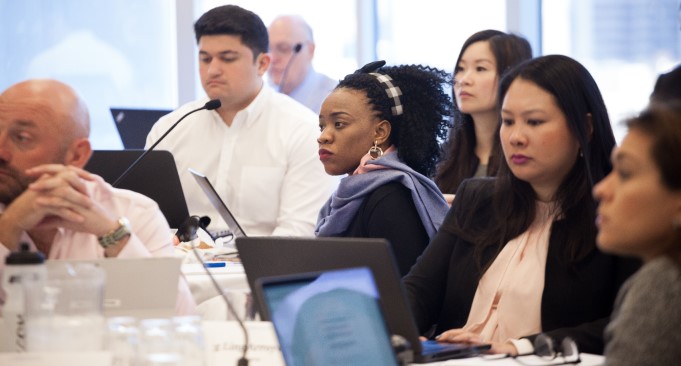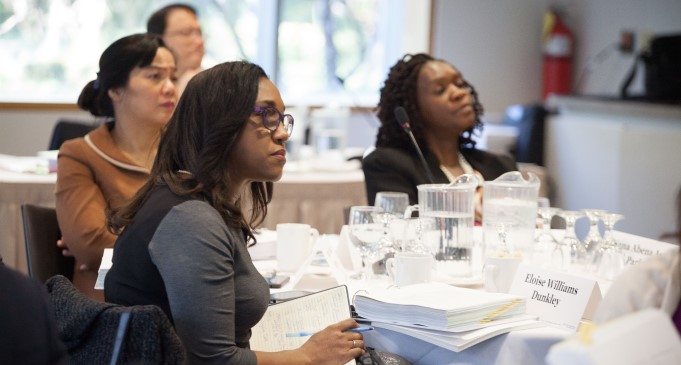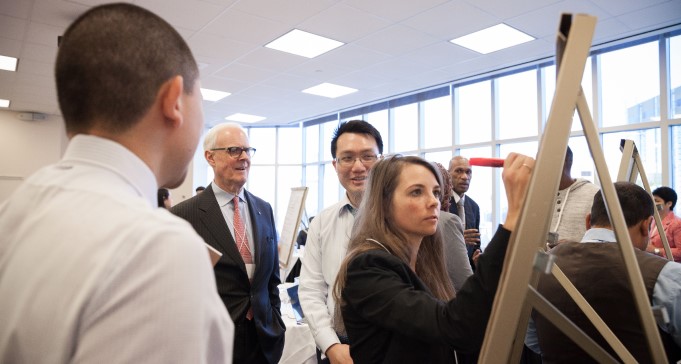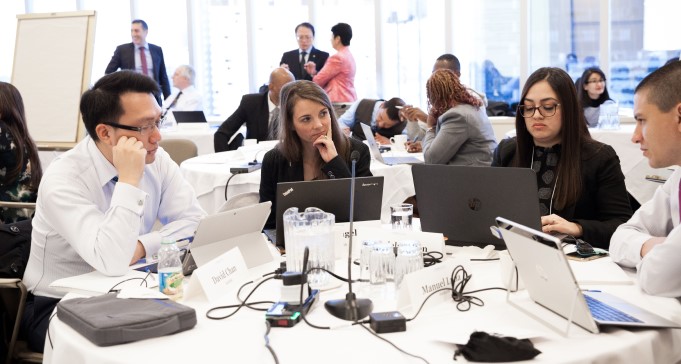In this podcast, Steven M. Rothstein discusses changes in USA climate policy and the potential impact for domestic and international supervisors and regulators.
Read the full transcript:
Anatol Monid:
Hi everyone. Welcome to TC Podcasts on the go. I'm Anatol Monid, program director with the Toronto Centre. Today, I have the pleasure of speaking with Mr. Steven Rothstein. Mr. Rothstein is the founding managing director of the Ceres Accelerator for Sustainable Capital Markets. The Ceres Accelerator aims to transform the practices and policies that govern capital markets to accelerate reduction of the worst financial impacts of the climate crisis, and other sustainability threats. Steven explores the most effective strategies to move capital markets towards climate sustainability. Today, our conversation will focus on the impact of changes in the USA climate policy for supervisors and regulators, both domestic and international. His profile is available on our website. Welcome Mr. Rothstein, Steven, and thank you for taking the time to speak with me today.
Steven Rothstein:
Thank you. I appreciate it and I appreciate all of the great information you share with this series and the great work of the Toronto Centre. So thanks so much.
Anatol Monid:
Great. So I think a lot is changing in the world today, and I know that the relationship between Canada's government and the United States is taking a new form. But I think the big news is that the United States of America has rejoined the Paris Agreement. What does this mean for US climate policy and for its financial services sectors?
Steven Rothstein:
Absolutely. And again, thank you for your invitation. It's traumatic. First, President Biden has said that climate is an all of government initiative, it's not just our environmental protection agency, it's every agency. And for the financial officials, like the Department of Treasury and our regulators, like our Federal Reserve, and SEC, they're all addressing this in different ways. So joining Paris is important, there also is a group, as many of your listeners know that the central banks have, The Network For The Greening of The Financial System. And that US has joined that as well. I think they're number 86 or 87 in that piece of it. Janet Yellen, the Secretary of Treasury, recently announced that she's going to co-head with China, a G20 initiative on climate. We're really looking throughout the government from the president and obviously the environmental agencies, having Secretary John Kerry in the role he's in is important, the work that Janet Yellen is doing, but the regulatory agencies are starting their efforts as well.
Anatol Monid:
Great. Well, that's good news for everybody I think. Moving on, the report entitled Managing Climate Risks in the United States Financial System was the first of its kind effort from a US government entity, released in 2020 by the Commodities Future Trading Commission's Market Risk Advisory Committee, or MARK. The CFTC commissioner, Behnam said that, "Beyond their physical devastation and tragic loss of life and livelihood, escalating weather events also pose significant challenges for the financial system and our ability to sustain long-term economic growth." What was the significance of this report and what does it mean for you as regulators?
Steven Rothstein:
So, it's very significant. Ceres came out with a report last June, talking about the role of regulators, but this report from the Commodities Future Trading Commission is the first one from a government agency and it's significant in three ways. First it covers a wide range of areas. There are 53 recommendations in there from the question about the price on carbon, which it recommends, to mandatory disclosure, to responsibilities of Central Bank from stress test and scenario analysis, to targeted industries like municipal bonds and auditing the insurance industry. So it's very broad, 53 recommendations.
The second is that it came out under the prior administration that we know is not as, I'll say as active in this area. And third, it was a very diverse group, there were 34 members, Ceres was one of them so we were very involved in this report, but there were oil companies, and there were insurance companies, and market-makers, and non-profits and others, and worked in a very open and honest way. And the final recommendations were 34 to zero. That meant it was a very broad base of support for these things from mandatory disclosure and carbon pricing and others, and that report came out in September.
Again, it was the first time the US government had identified that in the federal level. And now I don't want to say the flood gates have opened, but there have been a lot more momentum. The work, and I'll talk about this later, what the work of the Federal Reserve has done, the securities exchange commission, the CFTC and others, there's a lot of momentum there. So I think it brought urgency and legitimacy to this issue, which as we all know, we are in hopefully the final phases of the awful pandemic that Canada, US and other countries have been facing. And it is a nature-based crisis, but as awful as it is affecting all of our lives and livelihoods, there is no vaccine for climate change. And so while we will be better in terms of the pandemic in the coming months, if we don't address climate change, it's just going to get worse and worse and worse.
Anatol Monid:
You mentioned that Ceres had done a report, do you want to give us a little bit of insight into that?
Steven Rothstein:
Sure, so last June, Ceres did a report with 50 recommendations and the role of a financial regulators. We looked at in the US, unlike many other countries, we have a whole variety of regulatory agencies. So we covered nine federal financial regulatory agencies, the Federal Reserve, the Securities and Exchange Commission, other banking regulatory agencies, and then other agencies that deal with particular areas like The Federal Housing Finance Agency that deals with mortgages and other areas. Then we also looked at state banking and insurance commissioners.
Again, US, unlike many of the countries has a regulatory regime that is divided between the federal government and the states. More of the insurance work has done at the states, more the banking at the federal level. And so we had 50 recommendations and we went through for each agency, why we thought the recommendations were important. It was also important to say that every one of those recommendations, every single one has been operated by central banks or other regulatory agencies around the world. So we're not recommending new things, we're not recommending things that in some cases, to be honest, Canada's already done them, that haven't been done by other countries, or just by quote environmentalists. These are recommendations from central bankers and others, and they range again from stress tests, training bank examiners, declaring that climate is a systemic risk at a time no federal agency had done that. Since then several has and I'm happy to talk about that.
Anatol Monid:
Great. Thank you for that insight. Let's talk a little bit about the task force on climate-related financial disclosures. A Canadian and American were quite influential, mark Carney, our former bank governor, and the former governor of the Bank of England and the New York former mayor Bloomberg were all advocates for this. The task force was created to improve and expand the reporting of climate related financial information, providing investors with the data and the information needed to understand the risks they might be taking on, and for regulators to better understand and respond to the financial system risks of climate change. Are the task force recommendations being followed by US firms and being encouraged by their regulators or supervisors?
Steven Rothstein:
Great question. Thank you. Yes, so the recommendations for TCFD are very important. I think they're being used by over 1800 companies worldwide. Some countries have obviously mandated them and there is a lot of discussion in the US. So first what's happening with the US in terms of climate disclosure? Of the fortune 500's, the largest companies, over 80% of those companies have some form of climate disclosure. Some use TCFD, some use another methodology, it as a alphabet soup of organizations. Each one is good and adds a lot, but it's not comprehensive. So Ceres and others are recommending that there be mandatory climate disclosure from The Securities And Exchange Commission of the medium and large size companies. And we believe that using TCFD as a model would be very helpful. So we support that, but there has to be that process.
The Securities And Exchange Commission just recently opened a opportunity for comment, a 90 day comment about what kind of mandatory disclosure people want, what do they think is best, the question about the auditing firms and a variety of other key areas, so that's an important element to look at. So it is not being used universally, but it's you being used by more and more companies. There are other again, structures in place for voluntary disclosure that are important, but it's not consistent. I'll give you an example of an industry that is using it more and more, is the insurance industry and the work that they're doing in that area. And we can talk a little bit about that in just a minute. So TCFD is growing, but it's not being used as much. And we want to grow that across industries, both with voluntary work across companies, but then ultimately we believe there needs to be mandatory systems recommended by The Securities And Exchange Commission as there are in many other countries.
And why is mandatory disclosure important? I'll give you an example. The French Central Bank, in 2016 they required mandatory disclosure for the large financial institutions. Four years later, 2020, they looked at what was the impact, and with disclosure, not divestment requirement, but with disclosure, those financial institutions reduce their loan portfolio to oil and gas by 40%, 23 billion euros. So that's a very important element of what the role of disclosure is, because we fundamentally believe that TCFD and disclosure, disclosure is key. No one, if you're a banker, if you're a head of a fortune 500 or any company, or a regulator, you can't manage a problem if you can't measure a problem. The free market works, but it only works with good information. And so without that disclosure, people don't know what information they're working with and leaves them susceptible to much greater risk. So yes, we think that mandatory disclosure is critical and TCFD is a great model to build on.
Anatol Monid:
Thanks for that. So you mentioned insurance earlier, I follow the work of the National Association of Insurance Commissioners and their climate and resiliency taskforce coordinates the NEIC's domestic and international efforts on climate and sustainability issues, including the dialogue amongst regulators, industry insurance consumers, and other stakeholders. The NEIC has long been engaged in looking for ways to mitigate environmental risks and how to educate consumers to become more resilient. According to Ray farmer, the director of the South Carolina Department of Insurance and the co-chair of the committee, helping consumers and local governments find ways to prepare for and mitigate extreme weather is an important role of an insurance commissioner and this task force. what do you think the NEIC and other US regulators, are they doing enough on climate risks?
Steven Rothstein:
I think none of us are doing enough, that as individuals, regulators, businesses, the government, we all need to do more. That the UN said, if we don't make dramatic changes by 2030, that we will have some areas with irreparable harm. Just to give a context, you know, in the US and, and many other countries have seen these areas, but in the past 12 months, we've seen 10 times the acres that have burned in the US with fires on the Western part. We've seen more named tornadoes, 30, than we've seen in a long time. And not more than a month ago in Texas and some areas states there was freezing that affected businesses, we've had droughts in other areas, so the problems are getting worse and that means we collectively have to step up.
And the climate is one of those things and other people have said this, that it's, if you win slowly, you lose, because of mother nature is doing what mother nature wants. We can't stop it, we can be prepared unless we decided to take dramatic changes. And we're seeing some of that, businesses are doing that, investors are doing it. We just, Ceres is involved with an international consortium that between investors in US, Canada, Europe, and other places just a few months ago, we signed up investors representing $33 trillion, trillion dollars, of assets under management that have agreed to set net zero by 2050, they're going to work on their portfolios. We have the six major banks in the United States have all agreed to do that and are working on plans.
So there is a lot of progress being made, and I give the National Association of Insurance Commissioners Credit for the work they're doing. They have set up a very senior level task force, they have different work groups, four or five different work groups on hurricanes and storms and disclosure, and they're working hard on those areas. And they did start many years ago, a climate disclosure requirement, so there are six States, not NEIC, there are six States, but it represents about 70% of the insurance market. Require the bigger insurance companies to file annual climate disclosures, which Ceres was very involved with, which is great, but those disclosures are not detailed enough. And so in fact that they're recommending, the six commissioners, and we fully support it, that they require change to TCFD reporting. Speaking of TCFD, last year, eight insurance companies filed TCFD reports. So that's a good next step, and those are all public, they're available on the California insurance commissioner website.
There have been progress made with the New York, it's called the Department of Financial Services, their work there. In the state of Washington, California, there are many States that are doing some great work, but no, the answer is we as society aren't doing enough, insurance commissioners aren't, banking commissioners aren't, and NEIC are not doing enough. But I do having said that, appreciate the work they are doing, they're taking this very seriously and working on it.
Anatol Monid:
So there is hope?
Steven Rothstein:
Absolutely. Absolutely. I am an incurable optimist, and I've seen, climate is an enormous risk, but it's also an enormous opportunity. I mean, for banks, the two fastest trades, job creation in US, are solar and wind installers and manufacturers. So there's enormous opportunities and this is under the prior administration, under this new administration, the Biden administration we don't know the numbers yet, but they will be investments in infrastructure, investments in EV charging stations, investments in other things. So if you're a business or a bank, there are more and more green investments for you, opportunities.
It's also, if you look at the market place, last year more money was invested in ESG investments than ever before, by large numbers. And those funds did very well, they did better than the marketplace. If 10 years ago, you had invested in a fund that had the standard [inaudible 00:16:40], a mixed portfolio with the oil industry or one without the oil industry, you would have done a lot better on the one without the oil industry. So that while climate is a real risk and we have to be prepared for it, it also creates enormous market and business and financial opportunities.
Anatol Monid:
Thank you. So on the other side, climate risks may also exacerbate financial system vulnerability that have little [inaudible 00:17:52] with climate change, including vulnerabilities caused by the pandemic that has stressed balance sheets, strained government budgets, and depleted household wealth. What can US regulators and supervisors do with respect to climate risk through regulatory and supervisory associations to support international financial stability?
Steven Rothstein:
There is a lot they can do, and we've started to do that. So I mentioned earlier The Network For The Greening of The Financial System. So this is a group of central banks that the US Federal Reserve joined in December. Prior to that, it had only been the New York State Department of Financial Services that was a member. So by joining, and I know they're already working on this, there's different work streams at NGFS, and the US is participating in those. So US can both learn from others and eventually teach others. It's not at that stage yet, but it can be a collaborative process. There are a variety of other international forums from IOSCO, the International Securities Regulators, IFRS and others. So US is now participating, I don't want to say in every single one, but in a lot of those, and more and more all the time. Again it's only been less than roughly two months in the Biden administration.
And so there's a lot more there. And why is it important? It's important because large companies, large banks, large insurance companies are saying that they want an international standard, that they don't want to file one set of climate disclosure in one company in one set in another country. And I think eventually we want to move in that direction. We also want to learn from each other, that understanding what the bank of England, for example has been doing on stress testing, and what the EU is doing on their green taxonomy, and what's happening in other places. So I think we can learn from each other, there's a lot of smart people in the central bank world and the regulatory world around the world that the US can learn from, and as the US grows, the United States reserve has literally thousands of economists, and they're doing some great research now on different elements of climate, so that can be helpful.
So I think it is important that there is a good coordination at NGFS, at Basel, at IOSCO and others. And that's the way we're going to solve this, because clearly this climate crisis doesn't know country borders and can work from there. We're facing now a particular crisis because of the pandemic and the impact on the economy, so it means we have to work even harder together to be serious about this. So I think they can make an important impact there. I also would say, though, it is very important for the US, it's important to coordinate with international, but not to wait for international. That if it takes time to work these things out to us needs to have it today. We need to move forward quickly, and then it can be evolved just like many other things that the US may do or Canada or other countries may do, and then over time it may be evolved to align internationally.
Anatol Monid:
We seem to have a little bit more time, so I'm wondering if I can take advantage of your expertise. And you mentioned going to net zero and green investment opportunities. One of the things that I would like to hear from you about is the risks of green washing and how those may impact on investors or on governments and regulators, and any thoughts you have there?
Steven Rothstein:
It's a very serious issue and I appreciate your asking about it. And that there aren't good standards in the US, again, there is work that the EU is doing, some other countries are doing on this, and it's very important. A consumer needs to understand when they invest in either a climate fund or an ESG fund or something else, what they're really getting. So that's part of it, it relates back to the earlier comment I was saying about mandatory climate disclosure, that if there is a system and just like lots of other things, if Securities And Exchange Commission said, "Oh, you submit financial reports, but you decide what to do." And one company files a balance sheet and one an income statement, or one files it in Yen and one in Deutsche marks, you won't be to compare them. And that's where we are today with climate, that we don't have that comparison.
So this consistent area is important and that would dramatically reduce green washing because that is a risk right now in areas, and it's a risk in two ways. It is a risk from companies that want to be nefarious or untruthful or whatever you might think about it, who have ill motives. And then there are companies that have the best of intentions, but they just may not understand the science and understand the technology. So I think it is important as I say, there more money invested in ESG, but I know these funds have different standards. So what may quote, be defined as climate and fund A, may not be in fund B. And so having a mandatory disclosure, that way consumers and investors can make their own decisions. And that's to ensure the confidence in the system, that's very important.
Anatol Monid:
Thanks for that. A lot of the information you have provided us with at this point has been useful for regulators and supervisors and government officials and I applaud your work, Ceres' work on this. In the last opportunity, given our audience is largely regulators supervisors, what advice would you give them specifically or collectively about the potential impact of climate risks within their regulatory purviews?
Steven Rothstein:
Regulators overall, your listeners and participants, they do a great job and they do such an important job and they ensure the safety and soundness of the financial system. But we believe that risk is risk, whether it be cryptocurrency risk, or foreign currency, or management, or pandemic, or climate, and that many regulators still aren't addressing climate as a serious risk. And to put it in context, we know more about the risk of climate today by orders of magnitude than we knew about the housing crisis in 07 and 08, before the subprime housing. And so just imagine if someone had come to a regulator 18 months ago and said, "Here's all this data on a pandemic." And a regulator said, "Oh, I don't care." Or had come in 07 about housing. That wouldn't have happened. Well, that's what's happening right now.
In some countries, not in all, the regulators are doing a great job and integrating it into the risk profile and others are not. And so while climate is unique in the impact of what it does, it is not unique in that every risk is unique and every risk has to be looked at. So we believe that regulators should look at their entire regulatory regime. So in their prudential supervision, in their monetary review, in their bank examination, I'll just give you one example. How many of your listeners, most, I'm assuming have examiners that go out to examine banks? How many of those examiners have been trained what questions to ask for on climate risk, so they know? I'm not saying it's not all the same answer, but they should at least be trained just like they should be trained on cryptocurrency and other kinds of things. Stress tests, I think we need to have stress tests to address climate. Banks are great at thinking about risk when they have information, but if there are two loans and one is more risky, that loan should be charged more.
Well, but if they don't know that one's more risky for climate, we did a study for example of the top, say two dozen banks in the United States. And we looked at a portion of their loan portfolio, just their syndicated loan portfolio, so it's not their entire loan portfolio. We identified using the same methodology that the European Central Bank uses, the same methodology, we identified over a half a trillion dollars, over $500 billion of loans that could be at risk based on transition. Based on if there is a dramatic inflation or recession or price on carbon or another pandemic or something else. So there is real risk built into the bank portfolios today that aren't being addressed. So we believe that regulators, I congratulate those that are looking at it seriously and hope that others go deeper and think of this as looking at everything you do and looking at risk.
It's also important, if I can just add a point about underserved communities, that I'll just take the United States for example, that we have a sad history of what's called redlining, of not serving people from Brown and Black communities as much, which led to institutional racism that's carried on generation after generation. Well, if you look today, a lot of those same communities are communities that are much more susceptible to climate risk. They have more plants in their area, they're closer to rivers, they're less able to sustain changes. So it is important from a societal perspective as well to try to meet those needs and to ensure full employment in those areas. So it is critical again, to think about risk is risk and climate is one of those for all society, and then to think about vulnerable communities as a part of that.
Thank you. That was insightful. And just to mention that the Toronto Centre has developed and delivered climate risk programs covering climate change, extreme weather, risk, green finance, and other environmental risks that may be impacting the world's financial systems. We're happy to discuss any opportunity to develop such a program for jurisdictions, authorities and agencies that are listening today. You've done a great job of covering the landscape, both from a US perspective and a general perspective on climate risk. Any closing thoughts for our audience?
I guess first is to thank you personally, and the Toronto Centre again, that you all do such important work, not I mean, in climate, but on so many issues. And Toronto Centre is a real gem, is a real resource for central banks and others. So first to thank you for your work, it's so important, information is important. And just on that theme, we hope that everyone shares what they're doing on climate. For example, since last June, when I started tracking this, we've noticed 337 major speeches or reports on climate from central bankers, from other regulators, from constituents, from bankers. So there's a lot of information out there, but we hope to learn more. And that I hope that everyone who's listening, we'll reach out again, Steven Rothstein at Ceres. My email is SRothstein@Ceres, C-E-R-E-S dot org. And we'd like to be a resource, that each of you play such critical roles, not just in the safety and soundness of your banks and financial institutions and insurance companies, but in the safety and soundness of your economy.
That if there are fires and floods, that businesses aren't going to last, I mean, there's a study just in the US, for example, that the US alone will have tens of millions of climate migrants, tens of millions of climate migrants from within the US who can't live or work where they are, and that number worldwide is hundreds. We have the largest refugee situation in the world over the next decades because of climate, if we don't, and that will affect all our respective countries economies and market stability. So sharing information and getting on it right away. So again, I want to end by thanking you and thanking all of the listeners.
Anatol Monid:
Thank you, Steven. I appreciate it very much. I'm here today in Toronto, Canada, speaking with Mr. Steven Rothstein, managing director of Ceres Accelerator For Sustainable Capital Markets. And you've been listening to Toronto Centre Podcast On The Go. Thanks for joining us.


























